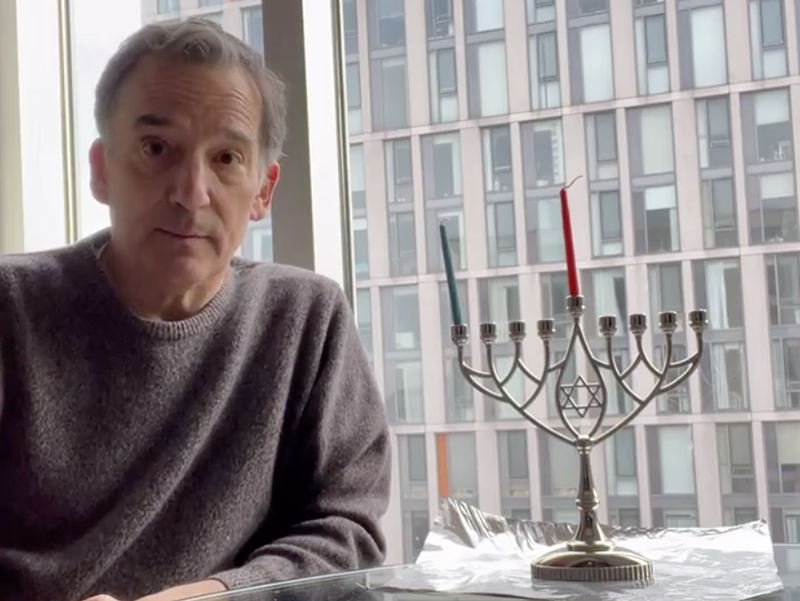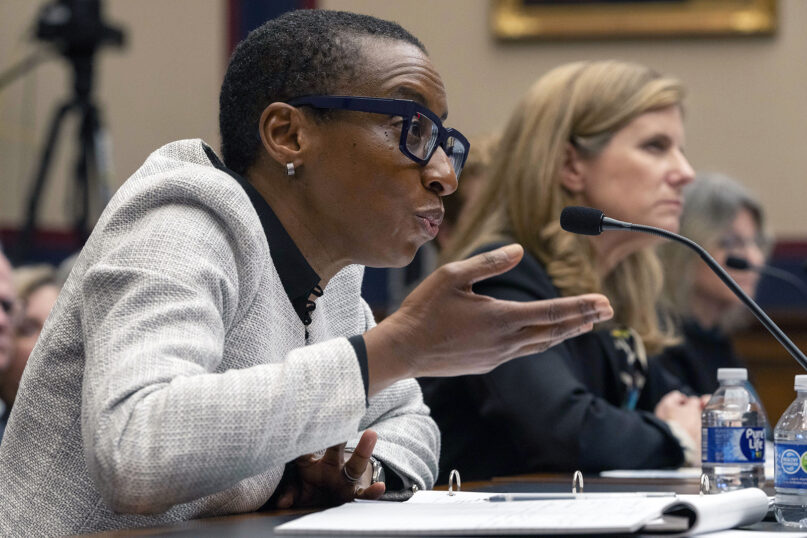(RNS) — On Dec. 7, Rabbi David Wolpe announced he would resign from Harvard University’s antisemitism advisory group. The decision followed the contentious congressional hearing at which the presidents of Harvard, the University of Pennsylvania and the Massachusetts Institute of Technology struggled to answer questions about antisemitism on campus.
Wolpe, one of the country’s most prominent rabbis, concluded the problem of antisemitism at Harvard was beyond the weight of his wisdom and experience.
As he posted on X and Facebook, “Without rehashing all of the obvious reasons that have been endlessly adumbrated online, and with great respect for the members of the committee, the short explanation is that both events on campus and the painfully inadequate testimony reinforced the idea that I cannot make the sort of difference I had hoped.”
Wolpe last year retired from Los Angeles’ Sinai Temple, where he is now rabbi emeritus after more than two decades as senior rabbi of the congregation, part of the Conservative movement of Judaism. He serves as a rabbinic adviser to the Anti-Defamation League and is a senior adviser of the pro-Israel Maimonides Fund.
RELATED: Loaded words can end with loaded guns
During the 2023-24 academic year he is a visiting professor at Harvard Divinity School and in January will teach a class titled “Sources of Jewish Spirituality.”
Wolpe has been known as a champion of listening and of dialogue. He gamely jostled in the past with atheist Christopher Hitchens and is known for trying to constructively engage with people of differing opinions.
In a July interview with Religion News Service, he said the recent rise in antisemitism in America was a surprise.
“I thought this was going to be my father’s issue,” he said. “Boy, was I wrong.” But he added, “we’re too experienced a people to panic.”

Rabbi David Wolpe in a recent video about Hanukkah on social media. (Video screen grab)
In an interview the day after Penn President Liz Magill resigned, he discussed how he intends to address antisemitism now that he is not constrained by his Harvard committee role. The interview was edited for length and clarity.
How has it been to be on a university campus this semester after the events of Oct. 7?
The Jewish students that I spoke to are unsettled and sometimes scared. The protests are designed for maximum awareness and impact but for the most part people are going to class. It’s college, punctuated by unpleasant realities.
Has antisemitism come up during your time at Harvard Divinity School?
I have been in many discussions. Most of my time on the antisemitism committee, I fielded calls and was having meetings with faculty, alumni, parents and students. From Oct. 7 on, obviously it has been the dominant concern in my life. I am doing it on several different fronts and still serving as emeritus rabbi at Sinai Temple.
After your resignation you wrote, “Part of the problem is a simple herd mentality — people screaming slogans whose meaning and implications they know nothing of.” Is there a way to undo this herd mentality?
I think that if universities would allow speech that does not disrupt classrooms that would help take some of the cachet away from the protests. A lot of college is about fitting in. As long as this ideology is not countered people want to fit in.
Is there something that will make a difference?
Time and education. What is happening now is a hopeful sign — the fact that universities are hearing from donors, one of the presidents resigned. Things are happening on campus. People may start rethinking what they assumed to be true.
Do you think the resignation might lead to charges that U.S. Jews forced this president out of her job?
I don’t know. For those with ill will towards Jews there are always good reasons to increase it. Those of good will understand. Anyone who is not a person of ill will understands why this is a problem and something needs to be done.
All three college presidents testifying were coached by lawyers. What do you think of their performance?
Listening to the testimony was exquisitely painful. The preparation was clearly abysmal. A moment of indignation would have meant the world to people. A moment where one says “I don’t want hatred on my campus. This grieves me. I will fix it,” would have been great.
You grew up mostly in Philadelphia. What is your reaction to the cries of genocide during a protest outside of Michael Solomonov’s Philadelphia restaurant Goldie on Dec. 3?
It is viscerally jolting. Disgusting. And it’s reflective of a deep pathology that needs desperately to be addressed.
How do you intend to address antisemitism at Harvard now that you are not on the committee?
On the committee, I was bound by confidentiality. Now I can speak about what I want, what I decide is important to say. One thing I won’t do is talk about individuals. Not my place.
You once reassured me that Jews belong in this country. Could you provide that reassurance today, particularly on a college campus to students?
I can provide that assurance in America in general. The vast majority of Americans still support Israel. Antisemitism is not what it is in other countries. On the university campus there is an ideology unsympathetic to Israel and Jews but a campus is not reflective of all America. Most students just want to go to class, do well, succeed. Agitators drive this, primarily a small number of students and faculty, a fervent group among fellow travelers. The ideology of colonial-settlerism is so prevalent.
What do you say to students at Harvard Hillel who don’t know how to react when they experience antisemitism?
Depends what the incident is. I advise them to make common cause with other Jewish students. Not be silent.
Should we Jews make common cause only with Jews?
Well, we have many, many allies. Jews are better at identifying enemies than embracing friends. There are so many people of goodwill.
(Beth Kissileff is the co-editor of “Bound in the Bond of Life: Pittsburgh Writers Reflect on the Tree of Life Tragedy.” The views expressed in this commentary do not necessarily reflect those of Religion News Service.)
RELATED: The pope called it genocide. I know what I heard.





